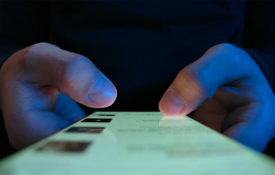-

Repeated Exposure to News Headlines Makes Behavior Seem Less Unethical
From frequent smartphone notifications to repetitious TV news programs, we often experience repeated exposure to various news headlines as we go about our daily lives. When the news provides stories of wrongdoing, that repeated exposure may influence our own sense of morality, making those narratives seem more true and less unethical.
-
Why We Can’t Stop Bingeing Old Shows During The Pandemic
NPR’s Lulu Garcia-Navarro speaks to media psychologist Pamela Rutledge about how our brains are responding to the pandemic and driving our TV viewing choices. Hint: We’re craving predicability. LULU GARCIA-NAVARRO, HOST: * You may be
-

Wonder Woman’s Secret Roots in Psychological Science
Wonder Woman was first showcased in a 1941 issue of All-Star Comics, but her origins can be traced back to a psychophysiology lab started by William James.
-
You’ve probably been tricked by fake news and don’t know it
ScienceNews: If you spent Thanksgiving trying in vain to convince relatives that the Pope didn’t really endorse Donald Trump or that Hillary Clinton didn’t sell weapons to ISIS, fake news has already weaseled its way
-
Most Students Don’t Know When News Is Fake, Stanford Study Finds
The Wall Street Journal: Preteens and teens may appear dazzlingly fluent, flitting among social-media sites, uploading selfies and texting friends. But they’re often clueless about evaluating the accuracy and trustworthiness of what they find. Some
-
The Price of Certainty
The New York Times: It’s alarming to see how polarized politics have become in the United States. The wider the gulf grows, the more people seem to be certain that the other side is wrong.

